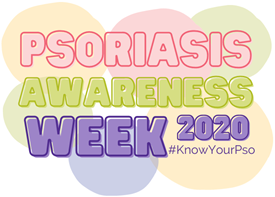29 October 2020
It's Psoriasis Awareness Week 2020!
This year we are turning the spotlight on to different types of psoriasis and want to encourage you to #KnowYourPso.
 Psoriasis Awareness Week 2020 starts today (World Psoriasis Day) and runs until Wednesday 4th November. It aims to raise awareness of psoriasis and psoriatic arthritis. 2020's theme is different types of psoriasis.
Psoriasis Awareness Week 2020 starts today (World Psoriasis Day) and runs until Wednesday 4th November. It aims to raise awareness of psoriasis and psoriatic arthritis. 2020's theme is different types of psoriasis.
Did you know that psoriasis can take several different forms? Over the course of the next week, we will take a closer look at the types of psoriasis which we are most commonly asked about on our helpline, the ways in which they are treated, and the impact they can have on people's lives.
You can get involved too! Download our supporters pack and digital media pack for some inspiration, share your support on social media using our digital toolkit, and encourage your MP to raise awareness of psoriasis in Parliament too.
Read on to find out more about what we have planned this week:
Plaque psoriasis – Thursday 29th October
We will kick off Psoriasis Awareness Week by focusing on plaque psoriasis – the most common form of psoriasis.
We'll have some plaque psoriasis information for you as well as a video story from one of our supporters. On top of this, psoriasis experts Professor Chris Griffiths and Dr Helen Young will be answering some of the questions you submitted during the recent psoriasis Priority Setting Partnership (PSP) exercise.
Scalp psoriasis – Friday 30th October
Friday 30th October will see us move our focus to scalp psoriasis. The scalp is one of the areas of the body which is most commonly affected by psoriasis.
We will be bringing you our top tips for managing scalp psoriasis, alongside more information about the condition and a Q&A with one of our supporters about life with scalp psoriasis too.
Guttate psoriasis – Monday 2nd November
Monday 2nd November will see the spotlight on guttate psoriasis – a type of psoriasis which is particularly common in children, teenagers and younger adults.
We will be holding a guttate psoriasis Q&A with Consultant Dermatologist, Dr Julia Schofield on Monday 2nd November, to answer your pre-submitted questions! The Q&A will be accompanied by a guttate psoriasis infographic and a story from someone with first-hand experience of the condition too.
Pustular psoriasis – Tuesday 3rd November
Pustular psoriasis will be our focus on Tuesday 3rd November. This is a kind of psoriasis where small white or yellow blisters (pustules) appear on top of very red or darkened skin.
There are two different types of pustular psoriasis: Palmoplantar Pustulosis (PPP), which affects only the palms of the hands and/or soles of the feet; and Generalised Pustular Psoriasis (GPP) which looks similar to PPP but is usually widespread across the body, rather than confined to a particular area.
We will be bringing you a Q&A with Psoriasis Association-funded researcher, Dr Francesca Capon, who will explain more about her team's important research into pustular psoriasis. We will have more information and a real-life story to share too.
Psoriatic arthritis and nail psoriasis – Wednesday 4th November
On the final day of Psoriasis Awareness Week, we will look at psoriatic arthritis – an inflammatory arthritis which is associated with psoriasis – and nail psoriasis, which affects up to 50% of all people with psoriasis and up to 80% of people with psoriatic arthritis.
Consultant Rheumatologist, Dr Laura Coates will provide an update on the Psoriatic Arthritis Priority Setting Partnership – an exercise to help find the ‘Top 10’ questions that future psoriatic arthritis research should address. We will also be hearing from someone who is living with psoriatic arthritis and somebody who is living with nail psoriasis.
Finally, we will also be holding our FREE webinar, ‘Psoriasis, COVID-19 and Me’ via Zoom from 5.30pm – 7pm, so be sure to book your place in advance.